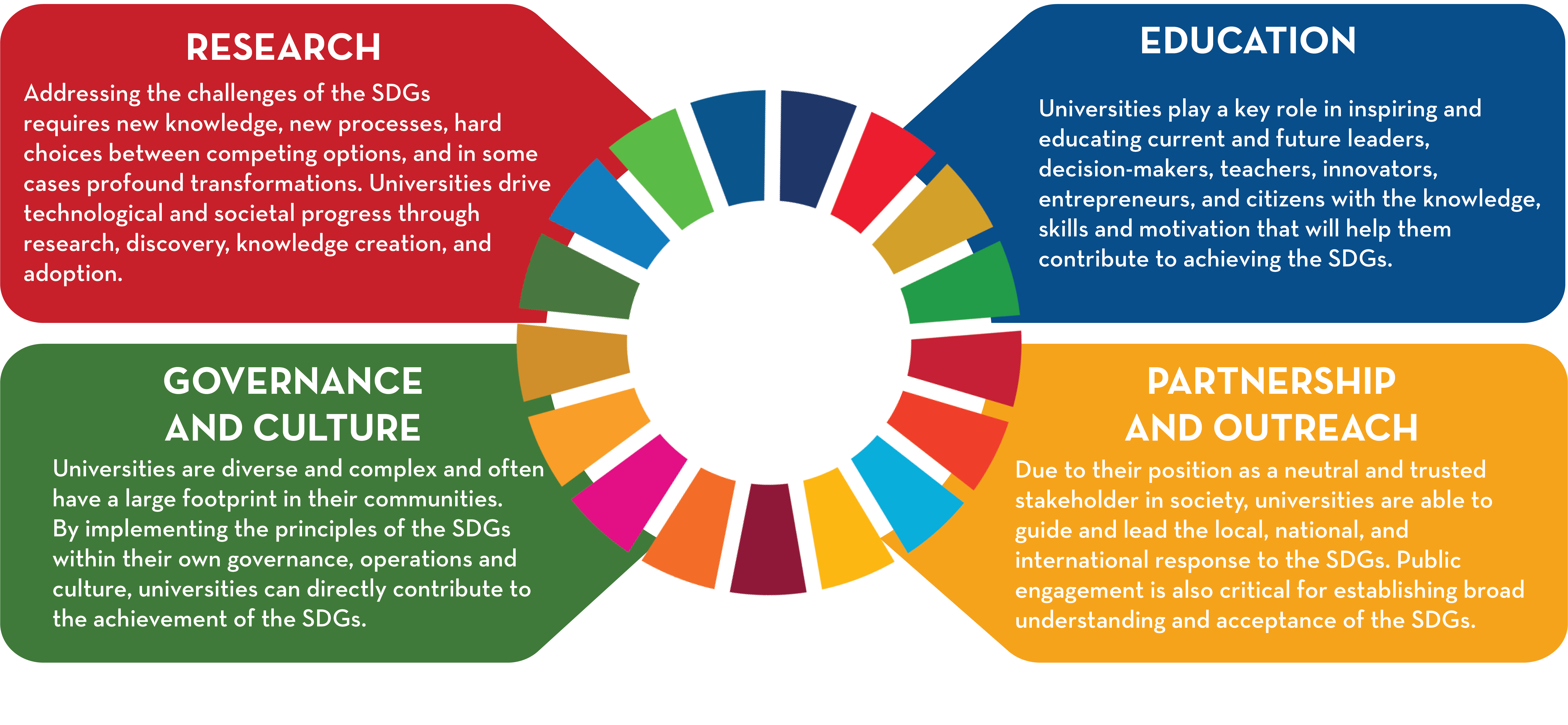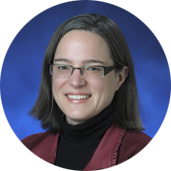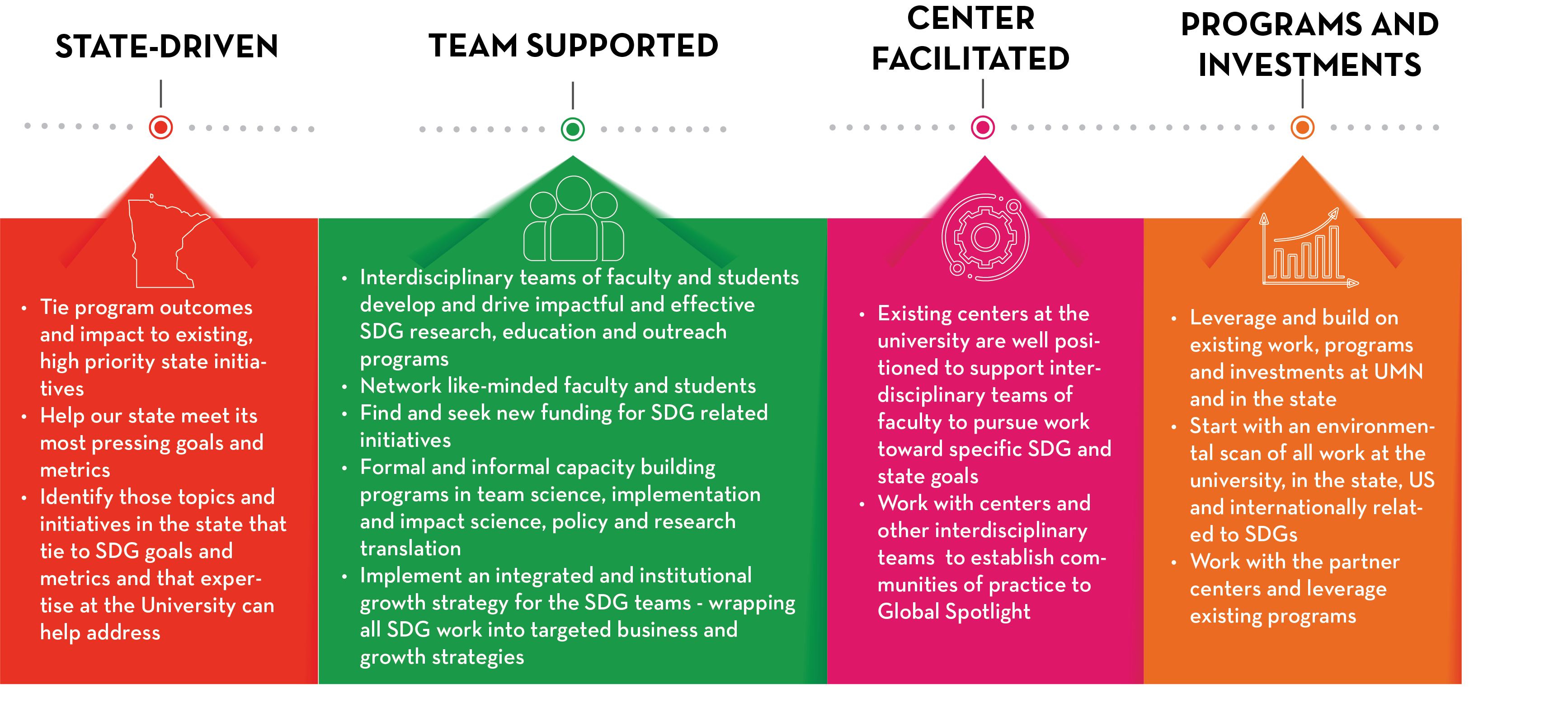From Minnesota to the World...
The 2030 Agenda for Sustainable Development was adopted by all United Nations member states in 2015 as a 15-year plan for global sustainable development. The SDGs framework includes 17 Sustainable Development Goals (SDGs) that provide a shared blueprint for peace and prosperity for people and the planet, and drives efforts at local, national, and global partnership levels. The SDGs offer an inherently integrative and interdisciplinary approach highlighting linkages between ending poverty, improving health and education, and addressing climate change and other environmental degradation.
Universities Role in Supporting the SDGs
Due to their unique position in society as drivers of both innovation and knowledge dissemination, Universities have a critical role to play if we are to achieve the SDGs by 2030. Significantly, Universities can also greatly benefit by engaging in the SDGs.

To get started with the SDGs, a whole-of-university approach is essential for this work and generally starts with the following steps:
- Mapping what is already being done
- Building internal capacity and ownership of the SDGs
- Identifying priorities, opportunities and gaps
- Integrating, implementing and embedding the SDGs within university strategies, policies and plans
- Monitoring, evaluating and communicating actions on the SDGs
How Has the University of Minnesota Responded?
Throughout this website you fill find examples of how the University of Minnesota is responding to both the challenge and opportunity poised by implementing the SDGs across our system--including the establishment of the UMN SDG Initiative in Fall 2019.
What is the UMN SDG Initiative?

The University of Minnesota Sustainable Development Goals Initiative seeks to support and promote transdisciplinary research, teaching, and partnerships to mobilize the resources at the University to advance a more socially and environmentally sustainable future in Minnesota, the U.S., and the globe through grants, information, and opportunities linked to SDG targets and indicators. The Initiative is supported by the Global Programs and Strategy Alliance in partnership with several administrative units including the Office for Public Engagement and the Office of Sustainability.
SDG Initiative Leadership

Karen Brown, PhD
- Co-Lead of UMN Sustainable Development Initiative
- [email protected]
Karen is director of the Interdisciplinary Center for the Study of Global Change (ICGC), a campus-wide center focused on global social justice and a unit of the Global Programs and Strategy Alliance at the University of Minnesota. She creates, directs, and teaches in interdisciplinary and global programs and partnerships, including fellowship programs to support graduate students, a master's program in international development (Master of Development Practice) with the Humphrey School of Public Affairs, and a graduate minor in Development Studies and Social Change. Dr. Brown holds a PhD in Political Science and MA in East Asian Studies from the University of Minnesota and a BS in Chinese from Georgetown University. Her academic interests focus on gender and global policy, children and international politics, and interdisciplinarity.

Katey Pelican, DVM, PhD
- Co-Lead of UMN Sustainable Development Initiative
- [email protected]
Katey Pelican is a founding co-director of the UMN's Strategic Partnerships and Research Collaborative (SPARC) and has led large-scale trans-disciplinary, multisectoral programs at UMN since she arrived in 2007. She was initially hired by the University to start an Ecosystem Health program at the College of Veterinary Medicine, a program that has now grown into a 16 member One Health Division focused on addressing local and global health challenges at the intersection of humans, animals and the changing environment. Since then, Dr. Pelican has overseen over $85 million implementing programs in the One Health realm. She was Principal Investigator of the USAID One Health Workforce Project, which supported university networks in Africa and Asia to build a global workforce to prevent, detect and respond to infectious disease threats.
Our Approach
Leverage all Corners of the University to achieve state, national and international metrics.

Contact us
For general questions, contact the UMN SDG Initiative team at [email protected].

